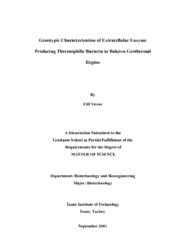Please use this identifier to cite or link to this item:
https://hdl.handle.net/11147/3766Full metadata record
| DC Field | Value | Language |
|---|---|---|
| dc.contributor.advisor | Yenidünya, Ali Fazıl | - |
| dc.contributor.author | Yavuz, Elif | - |
| dc.date.accessioned | 2014-07-22T13:52:19Z | - |
| dc.date.available | 2014-07-22T13:52:19Z | - |
| dc.date.issued | 2003 | - |
| dc.identifier.uri | http://hdl.handle.net/11147/3766 | - |
| dc.description | Thesis (Master)--İzmir Institute of Technology, Biotechnology and Bioengineering, İzmir, 2003 | en_US |
| dc.description | Includes bibliographical references (leaves:75-86) | en_US |
| dc.description | Text in English;Abstract: Turkish and English | en_US |
| dc.description | xii, 86 leaves | en_US |
| dc.description.abstract | Thermophiles are the organisms which are adapted to live at high temperatures. The enzymes from thermophiles find a number of commercial applications because of their thermostability and thermoactivity. Therefore, the isolation of thermophilic bacteria from natural sources and their identification are very important in terms of discovering new industrial enzymes.In keeping with this view, Balçova Geothermal Region could serve as a good source for new thermophilic microorganisms with novel industrially important properties.The aim of this research was therefore the isolation of industrially important extracellular enzyme producing thermophilic bacteria from Balçova Geothermal Region and their identification by genetical means. 16S-ITS rDNA RFLP, plasmid profiling and pulsed field gel electrophoresis studies were performed for this purpose.112 thermophilic strains were isolated from various environmental samples collected within Balçova Geothermal Region. These strains were screened for the existence of 6 extracellular enzyme activities. These were, lipases, amylases, proteases, xylanases, cellulases and pectinases. In total, 110 lipase (tween 20 as substrate), 106 amylase, 55 protease, 28 xylanase, 10 cellulase and 3 pectinase activities were detected.Some other phenotypic tests were also performed for these isolated strains. Since all the isolated strains were Gram (+), endospore forming rods, they were identified as Bacillus sp.16S-ITS rDNA RFLP and plasmid RFLP profiles were produced by using two restriction endonucleases Taq I and Hae III . The isolated strains were clustered into eleven groups by Taq I restriction profiles of 16S-ITS rDNA while nine groups were obtained by Hae III digestion profiles. When these groups were compared, it was concluded that 17 genotypically different strains existed in total 112 isolates. Two of the isolated strains yielded similar RFLP profiles to those of Bacillus stearothermophilus (CECT 43) reference strain.Plasmid profiling was also performed. It was found that 23 of the isolated strains contained plasmid DNA. Hae III restriction profiles indicated the existence of three different types of plasmids.PFGE optimization studies by Sma I restriction endonuclease for thermophilic Bacilli were also performed. A new method for preparation of agarose plugs was developed. | en_US |
| dc.language.iso | en | en_US |
| dc.publisher | Izmir Institute of Technology | en_US |
| dc.rights | info:eu-repo/semantics/openAccess | en_US |
| dc.subject.lcc | TP248.27.M53 Y38 2003 | en |
| dc.subject.lcsh | Biotechnological microorganisms--Isolation | en |
| dc.subject.lcsh | Thermophilic bacteria | en |
| dc.subject.lcsh | Extracellular enzymes | en |
| dc.title | Genotypic Characterization of Extracellular Enzyme Producing Thermophilic Bacteria in Balçova Geothermal Region | en_US |
| dc.type | Master Thesis | en_US |
| dc.institutionauthor | Yavuz, Elif | - |
| dc.department | Thesis (Master)--İzmir Institute of Technology, Bioengineering | en_US |
| dc.relation.publicationcategory | Tez | en_US |
| dc.identifier.wosquality | N/A | - |
| dc.identifier.scopusquality | N/A | - |
| item.openairetype | Master Thesis | - |
| item.cerifentitytype | Publications | - |
| item.grantfulltext | open | - |
| item.openairecristype | http://purl.org/coar/resource_type/c_18cf | - |
| item.fulltext | With Fulltext | - |
| item.languageiso639-1 | en | - |
| crisitem.author.dept | 01. Izmir Institute of Technology | - |
| Appears in Collections: | Master Degree / Yüksek Lisans Tezleri | |
Files in This Item:
| File | Description | Size | Format | |
|---|---|---|---|---|
| T000270.pdf | MasterThesis | 3.33 MB | Adobe PDF |  View/Open |
CORE Recommender
Items in GCRIS Repository are protected by copyright, with all rights reserved, unless otherwise indicated.